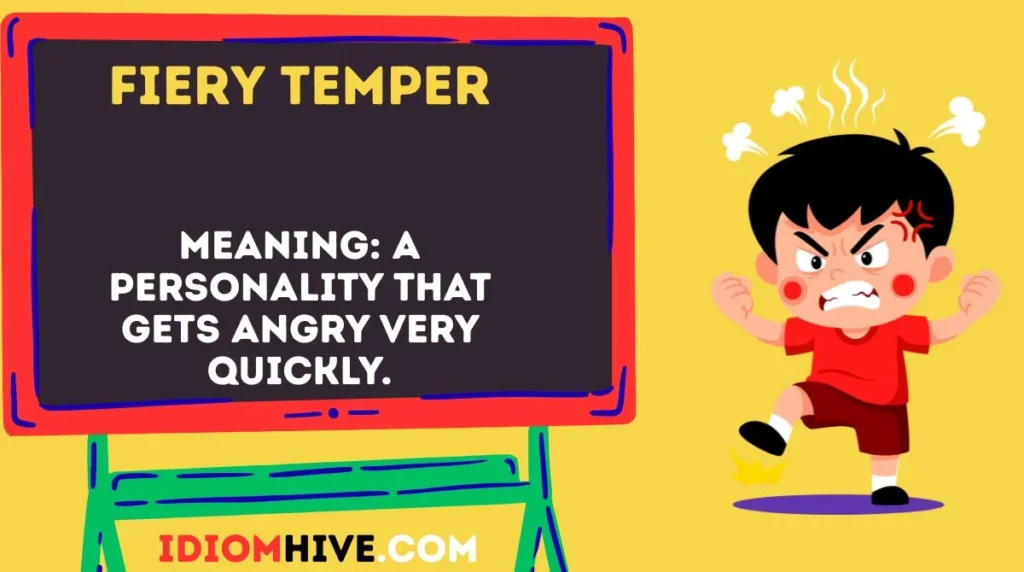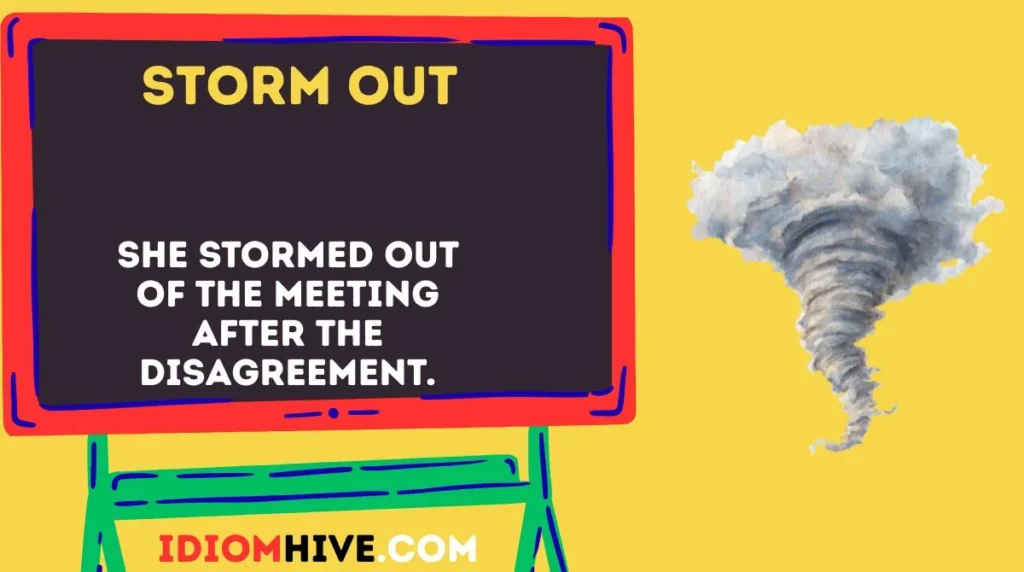Language is more than just words—it’s also about expressions, creativity, and culture. Idioms are one of the most colorful parts of English.
An idiom is a phrase whose meaning is not obvious from the individual words but carries a cultural or figurative meaning. For example, saying “spill the beans” doesn’t mean literally dropping beans—it means revealing a secret.
When it comes to emotions, especially anger, English has a wide variety of idioms. Idioms for angry are extremely useful because they allow us to describe emotions vividly, dramatically, and sometimes even humorously.
Instead of saying “I am very angry,” you can say “I hit the roof” or “I was hot under the collar.” These expressions not only make your English sound natural but also help you connect with native speakers at a deeper level.
Did You Know?
The English word “anger” comes from the Old Norse word angr, which originally meant “grief” or “sorrow.” Over time, its meaning shifted toward “rage” and “wrath.” That’s why many idioms about anger also carry intense imagery like fire, explosions, or storms!
Idioms for Angry
To make things easier, let’s explore idioms for angry under four main themes:
- Fire and Heat Idioms – anger compared to flames and heat.
- Explosion and Pressure Idioms – anger shown as bursting or blowing up.
- Animal-Related Anger Idioms – comparing angry people to wild animals.
- Everyday Anger Expressions – common idioms used in daily conversations.
Each idiom comes with its meaning, an example sentence, similar idioms, and a short reflection.
Fire and Heat Idioms
Burning with Anger
Meaning: Feeling extreme anger inside.
Example: She was burning with anger when she heard the unfair decision.
Alternative: Fuming
Note: Used in daily life and literature to show silent, inner rage.
Hot Under the Collar
Meaning: Becoming upset or irritated.
Example: He gets hot under the collar whenever someone questions his work.
Alternative: Lose one’s cool
Note: Common in casual speech.
Fiery Temper

Meaning: A personality that gets angry very quickly.
Example: His fiery temper often scares his colleagues.
Alternative: Short fuse
Note: Often used when describing a person’s nature.
Flames of Anger
Meaning: Intense anger that feels burning.
Example: Her flames of anger could be seen in her eyes.
Alternative: Boiling with rage
Note: More poetic, sometimes in storytelling.
Smoke Coming Out of One’s Ears
Meaning: Looking extremely angry.
Example: You could almost see smoke coming out of his ears after the insult.
Alternative: Fuming
Note: Humorous, informal.
Burn Up
Meaning: To become very angry.
Example: It really burns me up when people don’t keep promises.
Alternative: Steamed up
Note: Common in spoken English.
Heated Argument
Meaning: A discussion full of anger and emotion.
Example: The meeting turned into a heated argument over money.
Alternative: War of words
Note: Often used in formal and professional settings.
Explosion and Pressure Idioms
Blow One’s Top
Meaning: Lose temper suddenly.
Example: He blew his top when the kids broke the window.
Alternative: Flip out
Note: Informal and common in storytelling.
Blow a Fuse
Meaning: To become very angry suddenly.
Example: Don’t blow a fuse over such a small mistake.
Alternative: Lose one’s cool
Note: Informal, sometimes humorous.
Hit the Roof
Meaning: Explode with anger.
Example: Dad hit the roof when he saw the messy house.
Alternative: Go through the roof
Note: Everyday conversation.
Go Ballistic
Meaning: Become uncontrollably angry.
Example: The manager went ballistic after the deadline was missed.
Alternative: Go crazy with rage
Note: Informal but widely used.
Blow One’s Stack
Meaning: To lose control in anger.
Example: He blew his stack after hearing the rude comment.
Alternative: Fly off the handle
Note: Casual, expressive.
Explode with Rage
Meaning: Burst into anger suddenly.
Example: She exploded with rage when she found out the truth.
Alternative: Burst with anger
Note: Used in writing and speech.
Fly Off the Handle
Meaning: Lose temper unexpectedly.
Example: He flew off the handle when his project was rejected.
Alternative: Snap
Note: Everyday English.
Storm Out

Meaning: Leave angrily.
Example: She stormed out of the meeting after the disagreement.
Alternative: Walk out angrily
Note: Often used in daily life.
Go Through the Roof
Meaning: Become very angry very quickly.
Example: Mom went through the roof when she saw the broken vase.
Alternative: Hit the ceiling
Note: Common in spoken English.
Short Fuse
Meaning: Someone who gets angry easily.
Example: Be careful, he has a short fuse.
Alternative: Bad temper
Note: Common description of personality.
Animal-Related Anger Idioms
Mad as a Hornet
Meaning: Extremely angry.
Example: She was mad as a hornet after being ignored.
Alternative: Angry as a bear
Note: Informal, vivid.
Angry as a Wet Hen
Meaning: Very upset.
Example: He was angry as a wet hen after losing the game.
Alternative: Hopping mad
Note: Humorous.
Like a Bull in a China Shop
Meaning: Acting recklessly due to anger.
Example: He rushed in like a bull in a china shop, breaking everything.
Alternative: Hotheaded
Note: Common in criticism.
Barking Mad
Meaning: Wildly angry or crazy.
Example: She went barking mad after hearing the rumor.
Alternative: Nuts
Note: British English.
Wild Goose Chase (in anger)
Meaning: Chasing something in frustration.
Example: His anger sent him on a wild goose chase for answers.
Alternative: Pointless search
Note: Figurative, often literary.
Hopping Mad
Meaning: Extremely angry.
Example: She was hopping mad when the package didn’t arrive.
Alternative: Mad as hell
Note: Common in informal English.
Mad as a Bear with a Sore Head
Meaning: Bad-tempered and irritable.
Example: He was mad as a bear with a sore head this morning.
Alternative: Grumpy
Note: Used humorously.
Everyday Anger Expressions
Bite Someone’s Head Off
Meaning: Reply angrily without reason.
Example: She bit my head off just for asking a question.
Alternative: Snap at
Note: Informal, common.
In a Black Mood
Meaning: Feeling very bad-tempered.
Example: He’s in a black mood today, better stay away.
Alternative: Bad mood
Note: Everyday English.
Rub the Wrong Way
Meaning: Annoy someone and make them angry.
Example: His attitude really rubs me the wrong way.
Alternative: Get under someone’s skin
Note: Daily conversation.
Sick and Tired
Meaning: Angry and frustrated after a long time.
Example: I’m sick and tired of repeating myself.
Alternative: Fed up
Note: Very common in daily life.
Bite the Bullet (in anger)
Meaning: Force oneself to endure anger or frustration.
Example: He bit the bullet and stayed calm despite being angry.
Alternative: Hold back anger
Note: More formal.
Keep a Lid On It
Meaning: Control one’s anger.
Example: She tried hard to keep a lid on it during the meeting.
Alternative: Hold your temper
Note: Formal and informal.
Hot-Headed
Meaning: Quick to anger.
Example: He is too hot-headed to be a good leader.
Alternative: Fiery
Note: Used to describe personality.
In a Temper
Meaning: Angry mood.
Example: Don’t talk to him, he’s in a temper right now.
Alternative: Upset
Note: Common phrase.
To See Red

Meaning: Suddenly get very angry.
Example: I saw red when they insulted my family.
Alternative: Blow up
Note: Vivid, informal.
Chew Someone Out
Meaning: Scold angrily.
Example: The coach chewed them out after the poor performance.
Alternative: Tell off
Note: Used in sports, military, and work.
On the Warpath
Meaning: Very angry and ready to fight.
Example: The boss is on the warpath today, be careful.
Alternative: Looking for a fight
Note: Informal.
Ruffle Someone’s Feathers
Meaning: Make someone annoyed.
Example: His careless remarks ruffled her feathers.
Alternative: Irritate
Note: Gentle, polite way of saying it.
How to Use These Idioms in Daily Life
- Speaking: Use casual idioms like “blow one’s top” or “hot under the collar” when chatting with friends.
- Writing: Use idioms such as “heated argument” or “keep a lid on it” in professional emails or creative writing to sound natural.
- Professional Settings: More neutral idioms like “heated debate” or “short fuse” work well in workplace discussions.
Common Mistakes Learners Make With Idioms
- Wrong Context
❌ He literally saw red at the concert.
✔ He saw red when he heard the unfair comment. - Mixing Idioms
❌ He blew his collar off.
✔ He blew his top.
✔ He was hot under the collar. - Overusing Idioms
Using too many idioms in one sentence makes it confusing. Balance them naturally.
FAQs
1. Why are idioms important for expressing anger?
They make your English sound natural, expressive, and closer to native-level speech.
2. Can idioms be used in formal writing?
Some idioms like “heated debate” or “short fuse” can, but avoid very casual ones in formal documents.
3. Are anger idioms universal?
No. Different cultures use different metaphors, but many involve fire or explosions.
4. Which idioms are best for daily conversation?
“Blow one’s top,” “hot under the collar,” and “sick and tired” are most common.
5. How can I remember idioms easily?
Learn them with examples and practice using them in short stories or conversations.
Conclusion
Idioms are a wonderful way to add color, drama, and depth to your English. When it comes to expressing anger, idioms give us images of fire, storms, animals, and explosions—making emotions sound more vivid.
Instead of simply saying “I am angry,” you can now say “I’m fuming,” “I hit the roof,” or “I was hopping mad.” These expressions not only enrich your vocabulary but also make your conversations engaging and authentic.
So, next time anger strikes, try using one of these idioms—you’ll be surprised how naturally it fits into daily English!










